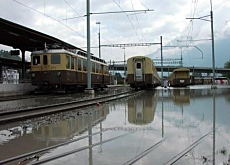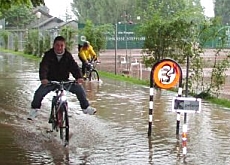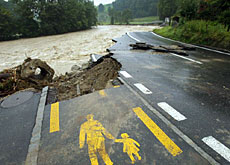Floods and landslides cut off alpine villages

Floods and landslides have cut off many villages in the Bernese Alps. swissinfo reports from the tourist hub of Interlaken, between the lakes of Thun and Brienz.
Emergency services fought to stop the flood waters from swamping the Interlaken West railway station, the resort’s last public transport link to the rest of the country.
On Tuesday, the resort of Interlaken – a starting point for mountain and lake excursions – became the region’s base for emergency operations.
“The road to Grindelwald has been severely damaged, as has the bridge in the Lütschen valley [to Grindelwald], which means traffic to the resort will be affected for a good length of time – weeks, if not months,” Walter Dietrich, head of Interlaken’s emergency task force, told swissinfo.
“We will eventually try to open a temporary road.”
It was not just Grindelwald that was cut off. The valley road leading to Lauterbrunnen and the mountain resorts of Wengen and Mürren above it was also closed, as were the roads heading east towards Meiringen and other villages in the Hasli valley.
Tens of thousands of inhabitants were sealed off from the outside world and thousands of tourists stranded. The only way out was by air, and local helicopter companies were doing a thriving, non-stop business, charging passengers between SFr120 ($94) and SFr150 ($118) a ride.
Airlift
Dietrich said he expected the Swiss army to provide logistical support, most likely in the form of helicopters which could airlift supplies to the affected villages.
“It depends on what the army can provide us with,” he added.
He said the task force was focusing its efforts on evacuating tourists from flooded hotels in Interlaken and, as the water level continued to rise, trying to keep the River Aare from flooding the railway tracks at the town’s western station.
The railway lines at Interlaken’s eastern station were submerged, and floodwaters had spilled into nearby apartment blocks, shops and offices.
“The damage to our office is enormous. The whole floor, all of the furniture and many files were damaged by water,” said Gerard Fuhrer, who heads the region’s social services department, located across the muddied street from the station.
“At the moment we’re trying to organise a portable container so we can set up a temporary office and resume our work as early as tomorrow.”
Bailing out
Bruno von Allmen, who runs a furniture shop, was one of many in the Interlaken business community still bailing out.
“We’ve never been affected by flooding before,” he told swissinfo. “Within an hour last night, the water rose 90cm,” he said. “When I arrived at 10.30 in the evening, it was already knee deep in the cellar. It was impossible to rescue anything.”
Von Allmen estimated the damage to his stock of wooden furniture alone at between SFr150,000 and SFr200,000.
Andreas Roth and other residents on Freiestrasse were making countless trips to the side of the road emptying pails.
“There’s about 10cm of water still in the cellar. We started removing the most important things last night, like our bicycles,” Roth said. “Then we started filling buckets and carrying them outside.
“We’ve got our washing machine, dryer and boiler down there. We’ve tried to remove enough water so they don’t get damaged,” he said before heading back down the stairs.
“We’ve had to close up shop, since we can’t offer any outdoor activities at the moment,” said Hano Tschabold, who runs the adventure sports company, Swiss Alpine Guides.
Weather improving?
Tschabold said he expected to open for business again in a couple of days, if the weather improved.
“We’ll be able to do paragliding trips, but obviously no river rafting or anything else that has to do with water, or ice climbing, since the access roads to the climbing areas are closed.
“We’re helpless in the face of a natural disaster like this. We’ve really seen how powerful Mother Nature can be,” he said.
Unable to travel up into the mountains, or around the lakes, most of the tourists in Interlaken wandered the streets, took pictures of the swollen river and flooded streets, or sat in cafes waiting for the weather to improve.
While there were long queues at the tourist and railway information offices, few seemed to be leaving. The resort’s hotels reported an 80 per cent average occupancy rate.
“We were hoping that the situation would improve,” said Anil Zaparde from New Jersey. “This is a fact of life. You can’t do anything about it, so it’s no big deal at all.”
swissinfo, Dale Bechtel in Interlaken
Interlaken is located between Lakes Brienz and Thun, both of which flooded their shores.
The mountain villages surrounding Interlaken, many of them tourist resorts, were cut off by landslides and flooding.
It is expected to take several weeks before key road and rail links in the region are in service again.

In compliance with the JTI standards
More: SWI swissinfo.ch certified by the Journalism Trust Initiative



You can find an overview of ongoing debates with our journalists here. Please join us!
If you want to start a conversation about a topic raised in this article or want to report factual errors, email us at english@swissinfo.ch.